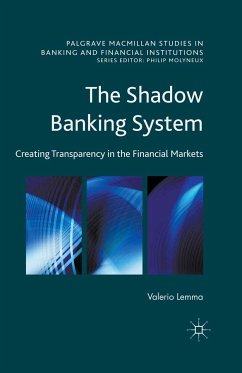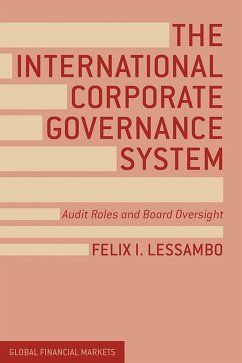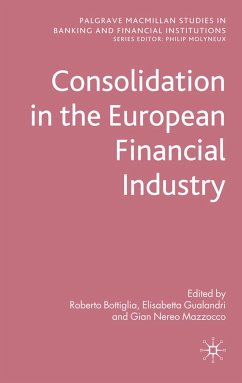
Felix I. Lessambo
eBook, PDF
The International Banking System (eBook, PDF)
Capital Adequacy, Core Businesses and Risk Management
Versandkostenfrei!
Sofort per Download lieferbar

PAYBACK Punkte
34 °P sammeln!





The International Banking System (eBook, PDF)
Dieser Download kann aus rechtlichen Gründen nur mit Rechnungsadresse in A, B, BG, CY, CZ, D, DK, EW, E, FIN, F, GR, HR, H, IRL, I, LT, L, LR, M, NL, PL, P, R, S, SLO, SK ausgeliefert werden.
- Geräte: PC
- ohne Kopierschutz
- eBook Hilfe
- Größe: 31.55MB
- Text-to-Speech
- E-Mail des Verlags für Barrierefreiheitsfragen: accessibilitysupport@springernature.com
- Keine Einschränkung der Vorlesefunktionen, außer bei spezifischen Ausnahmen
- Bekannt für fehlende wesentliche Barrierefreiheitsmerkmale
FELIX LESSAMBO is an Adjunct Associate Professor at St. John's University, USA (The Peter J. Tobin College of Business), where he teaches Financial Reporting: Evaluation and Analysis, Individual Tax Planning, and International Taxation. Prior to his St. John's appointment, Dr Lessambo taught Banking: Law & Economics, International Finance, International Tax, European Union Tax Laws at the University of Kinshasa (DRC). He specializes in the Taxation of International Business Transactions, Cross-border Transfer Pricing, E.U. laws, International Finance, and Alternative Investment Vehicles. He is the author of 'Taxation of International Business Transactions', 'Fundamentals of European Union Direct Tax', and 'Fundamentals of Hedge Funds'. Dr. Lessambo has co-authored two best-selling BNA- Special Reports on Hedge Funds and Real Estate Investment Trust ('REIT). He has published over fifty leading articles in international tax law reviews. Having practiced in International Tax, Alternative Investment Management, and Global Banking Groups, he structured and advised on Hedge Funds, Private Equity, and cross-border securitizations. Dr. Lessambo is the First scholar to argue against the incompatibility of the French Controlled Foreign Corporation (CFC), the French transfer pricing provision (Article 57); the French thin-capitalization rules (Article 212), the French tax regime of artists (Article 155A), and the Luxembourg securitization law, with respect to both the E.U. laws and the OECD treaty.
Produktdetails
- Verlag: Palgrave Macmillan UK
- Seitenzahl: 350
- Erscheinungstermin: 16. März 2020
- Englisch
- ISBN-13: 9781137275134
- Artikelnr.: 40060032
Für dieses Produkt wurde noch keine Bewertung abgegeben. Wir würden uns sehr freuen, wenn du die erste Bewertung schreibst!
Eine Bewertung schreiben
Eine Bewertung schreiben
Andere Kunden interessierten sich für











